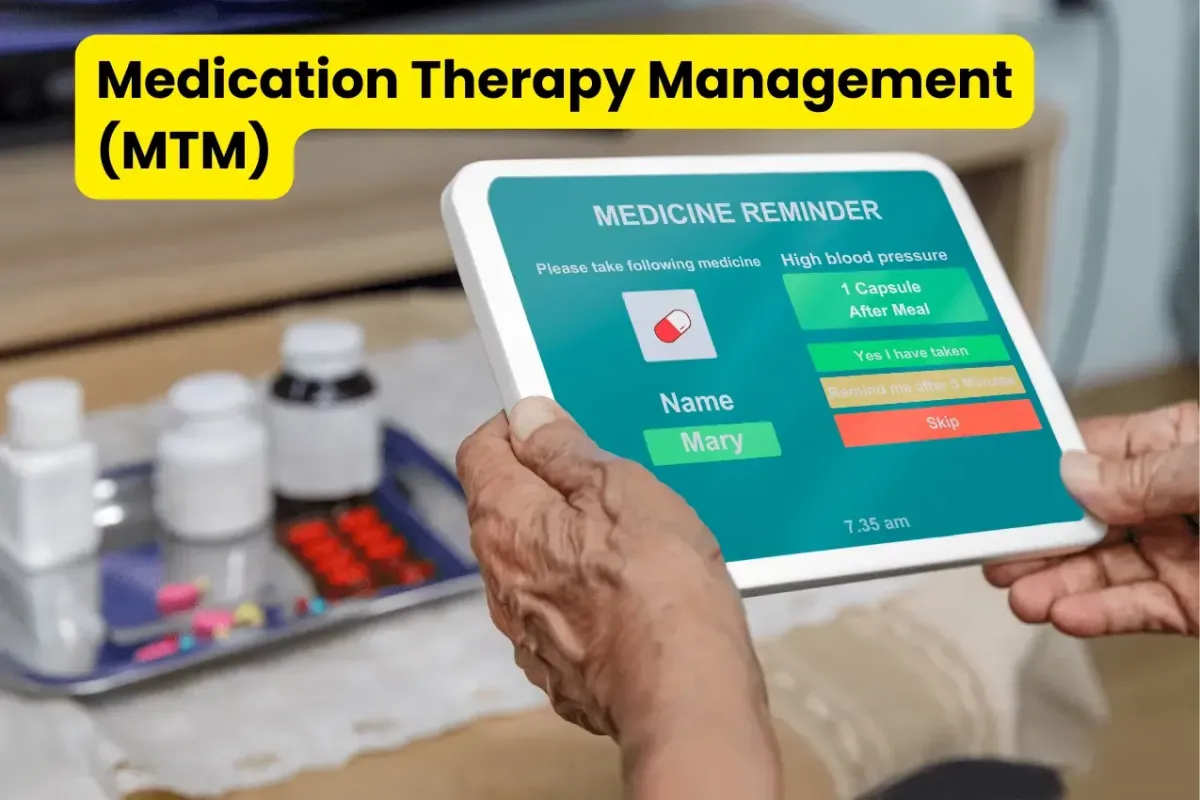
Medication Therapy Management (MTM)
What is Medication Therapy Management (MTM)?
Medication Therapy Management (MTM) is a service aimed at optimizing patient outcomes related to medication use. Typically provided by pharmacists or clinical staff, MTM includes:
Comprehensive Medication Reviews (CMR)
Medication reconciliation
Drug interaction checks
Patient education and support for adherence
Identifying and resolving medication-related issues
MTM is particularly beneficial for older adults, especially those on multiple medications or with chronic illnesses. In 2025, MTM is evolving to enhance patient outcomes, lower healthcare costs, and improve care coordination. As medication regimens become more complex, there is a growing emphasis on improving adherence and patient safety.
CMS Updates to Medication Therapy Management (MTM) in 2025
1. Expanded Eligibility and Reimbursement:
In January 2025, the Centers for Medicare & Medicaid Services (CMS) revised the eligibility criteria for MTM under Medicare Part D:
Patients now qualify if they take five or more chronic medications (down from eight).
A diagnosis of at least one chronic condition is required.
Total medication costs must exceed $4,935.
These changes broaden the patient base eligible for MTM and incentivize providers to integrate MTM into their care practices
2. Integration of AI and Clinical Decision Support:
Healthcare organizations are adopting AI-driven platforms that analyze medication profiles to identify potential drug interactions and suggest optimization strategies.These tools are integrated into Electronic Health Record (EHR) systems, enabling pharmacists and care teams to:
Identify high-risk patients.
Automate medication reviews.
Provide actionable recommendations.
3. Compliance with Interoperability Standards (TEFCA):
MTM platforms now adhere to the Trusted Exchange Framework and Common Agreement (TEFCA), facilitating improved data sharing among providers, pharmacists, and payers.
This compliance enhances medication reconciliation and supports coordinated, patient-centered care.
4. MTM in Value-Based Care:
MTM is now included as a performance measure in various value-based care models.
Providers who enhance medication adherence and reduce adverse drug events (ADEs) through MTM can earn shared savings from payers.
These updates reflect a significant shift towards improving patient care through better medication management and the use of technology.
Top 4 Use Cases of Medication Therapy Management (MTM) for Healthcare Providers
Chronic Disease Management:
MTM is crucial for managing chronic conditions like diabetes, COPD, and heart failure. It helps optimize medication regimens to ensure effectiveness.
Key outcomes from MTM reviews include:
Identification of duplicate therapies.
Detection of subtherapeutic doses.
Recognition of potential drug-drug and drug-disease interactions.
For instance, a diabetes patient on multiple overlapping medications may benefit from de-prescribing, leading to cost savings and better glycemic control.
Preventing Hospital Readmissions:
MTM plays a vital role in care transitions, particularly in hospitals and post-acute settings. Medication reconciliation after hospitalization aims to verify prior medication orders and prevent errors.
Effective post-discharge medication reconciliation can significantly reduce readmissions, a critical factor in value-based payment models.
For example, a patient discharged after a heart failure episode receives a Comprehensive Medication Review (CMR) within 72 hours, where the MTM pharmacist identifies a missing beta-blocker, thereby preventing potential readmission.
Supporting Value-Based Care Initiatives:
MTM services are integral to Accountable Care Organizations (ACOs) and other value-based care arrangements focused on improving medication adherence and reducing healthcare costs.
Providers can utilize MTM data to track intervention outcomes and demonstrate risk-adjusted savings.
For example, a primary care group collaborates with a pharmacist for MTM services for high-risk Medicare patients, resulting in improved medication adherence from 70% to 85% and a decrease in emergency visits, allowing the group to share in the savings.
Managing Polypharmacy in Older Adults:
MTM is particularly beneficial for older adults who often take five or more medications. MTM professionals assist healthcare providers in discontinuing unnecessary medications and managing adverse effects.
For instance, an 82-year-old patient with cognitive impairment using a sedating antihistamine may be switched to a safer alternative, reducing the risk of falls.
Specialty Medication Management:
Patients on specialty medications, such as biologics or cancer therapies, require ongoing monitoring and education. MTM professionals support these patients by managing side effects, ensuring medication compliance, and providing education on complex dosing regimens.
For example, an oncology patient starting oral chemotherapy is referred for MTM, where the pharmacist educates them on medication administration and helps manage side effects, including potential interactions with over-the-counter drugs.
These use cases highlight the essential role of MTM in enhancing patient care, improving outcomes, and optimizing medication use across various healthcare settings.
How Providers Can Integrate MTM into Their Practice
Collaborate with Pharmacies or MTM Partners:
Establish partnerships with local pharmacies or digital MTM service providers. Focus on those that can scale and offer clinical pharmacists for collaboration.
Utilize EHR-Integrated MTM Solutions:
Leverage MTM options embedded within your existing Electronic Health Record (EHR) system for efficient documentation and patient alerts.
Train Care Staff:
Educate nurses and care coordinators to identify patients who could benefit from MTM services and ensure proper referrals.
Incorporate MTM in CCM and RPM:
If you offer Chronic Care Management (CCM) or Remote Patient Monitoring (RPM), integrate MTM as a key component of care plans.
Monitor MTM Outcomes:
Use dashboards to track medication adherence, resolve medication-related issues, and minimize hospitalizations.
By following these steps, providers can effectively implement MTM into their practice, enhancing patient care and outcomes.
The Future of Medication Therapy Management
As medication regimens grow more complex, the importance of Medication Therapy Management (MTM) is set to increase. By 2025, MTM will be a key focus for providers operating within value-based care frameworks.
Supportive Environment:
Regulatory backing, technological innovations, and clear pathways for return on investment (ROI) are enhancing the effectiveness of MTM. This shift is transforming medication management from a reactive to a proactive, patient-centered practice.
Action Steps for Providers:
Whether you're in primary care, a specialty practice, or part of a health system, now is the ideal time to assess and update your MTM strategy to align with best practices.
Investing in MTM:
For healthcare providers aiming to boost patient outcomes, cut unnecessary costs, and improve quality metrics, adopting a modern MTM program is essential. Embracing this evolution is not just beneficial; it's crucial for future success.
TaskferHealth: Advancing Medication Therapy Management
As Medication Therapy Management (MTM) becomes increasingly vital in patient-centered care, providers need a reliable partner to enhance workflows and drive clinical decisions.
Human-Enabled Reviews: Intelligent algorithms streamline medication reviews, flagging issues like drug interactions and adherence problems, with human oversight to ensure accuracy and nuance.
Comprehensive Medication Reviews (CMRs): Conduct in-person or remote reviews to meet diverse patient needs.
EHR Integration: Access real-time patient data, including vitals and lab results, to evaluate medication impacts.
Patient Engagement: Use mobile apps and reminders to improve adherence and health literacy, reducing missed appointments.
Outcome Analytics: A powerful dashboard helps analyze results and demonstrate ROI for value-based care.
With TaskferHealth, primary care providers, specialty clinics, and health systems can enhance MTM services. Clients have seen a 19% reduction in adverse drug events within six months.
Schedule a demo to discover how TaskferHealth can transform MTM from a regulatory challenge into a competitive edge.

